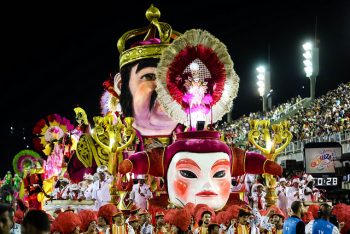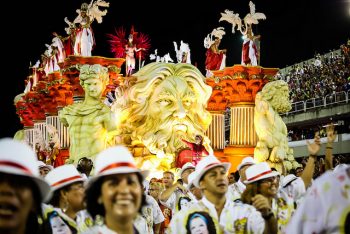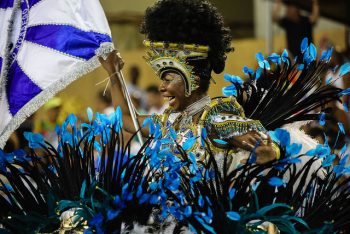The history of Carnaval Posted by carol on Mar 5, 2017 in Brazilian News, Brazilian Profile, Culture, Customs, Entertainment
If you’re currently in Brazil, you’ll notice that talking about the carnaval festivities is an unavoidable assunto (subject) in the country for the past few semanas (weeks). As we all know, the event is an element of our national culture and widely celebrated throughout the nation, in addition to being a major feriado (holiday). People even tend to dizer (say) “O ano só começa depois do Carnaval”, meaning that “the year only begins after carnaval”. The party, which ended last quarta (Wednesday) is the most popular and probably one of the largest events in Brazil.
So hoje (today), many foliões (relevelers) are ainda (still) mourning the end of party season. How about we focus on the passado (past), then, and learn a little more about history of Carnaval?
Although it is a typically Brazilian festa (party), its precise origins are uncertain and carnaval is known to be celebrated no mundo todo (worldwide). Commonly referred to as Mardi Gras in the US or Shrove Tuesday in England, these festivals are held all over Europe and America.
It is said that Carnaval has both pagan and catholic origins, dating back to the egyptians’ and romans’ and their celebrations. Então (so), Carnaval has historical roots from classic antiquity. Extravagant fun, games, masked balls, music, dancing and drinking have sempre (always) been characteristic of those days. And still are!
The palavra (word) allegedly comes from the latin expression carnis levale (translated as adeus à carne – farewell to the meat), related to a period of fasting which occured antes (before) easter. It is agora (now) known as quaresma (lent), when many religious people abstain from something. In Brazil, it is traditional to make a promessa (promise), that is, you renounce something that you really gosta (like), for example: beber (drinking), comer carne (eating meat), fumar (smoking), and only resume it when it’s easter. Some claim that this is an attempt from the Catholic church to appropriate Carnaval festivities and control wordly pleasures.
Aqui (here), early expressions of the public celebration were inspired by outras (other) European cultures. People used to toss water and flour at each other back then, that’s how Carnaval used to be in Brazil durante (during) colonial times, changing around the 19th century, quando (when) authentic Brazilian rhythms were then incorporated. Nevertheless, the party is often associated with a time of subversion of social roles, that is why there is the tradition of inverting characters and dressing in fantasias (costumes). It is também (also) a moment to indulge and give in to impulses and desires before returning to normal life.
Nowadays, what we come to know as Carnaval in the country probably transformed significantly. This cultural manifestation has gained immense proportions (it is one of the maiores – biggest in the world), millions of people crowd the ruas (streets), the desfiles (parades) and competitions between escolas de samba (samba schools) are even broadcast on television networks, which attracts thousands of tourists. Carnaval in Brazil usually starts at around cinquenta (50) days before easter and it dura (lasts) for quatro (4) days. We understand it as a date to put our daily worries and behavior on hold and enjoy liberdade (freedom)!
Here is a comprehensive list of older post related to carnaval so you can keep track of what we’ve been discussing on the subject:
https://blogs.transparent.com/portuguese/carnaval-2011-countdown-sao-paulo-samba-schools/
https://blogs.transparent.com/portuguese/carnaval-2011-countdown-chiclete-com-banana/
https://blogs.transparent.com/portuguese/carnaval/
https://blogs.transparent.com/portuguese/carnaval-de-rua/
https://blogs.transparent.com/portuguese/rio-carnival-documentaries/
https://blogs.transparent.com/portuguese/rio-de-janeiro-samba-schools/
https://blogs.transparent.com/portuguese/carnival-in-recife/
https://blogs.transparent.com/portuguese/lyrics-practice-mangueira/
https://blogs.transparent.com/portuguese/podcast-using-the-past-tense-to-discuss-carnival/
https://blogs.transparent.com/portuguese/carnival-in-brazil-rio-de-janeiro/
https://blogs.transparent.com/portuguese/carnival-in-brazil-salvador/
Now that’s enough of folia!
Tenham uma ótima semana! Have a great week!

Build vocabulary, practice pronunciation, and more with Transparent Language Online. Available anytime, anywhere, on any device.






